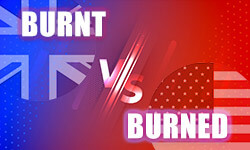
Maintaining consistency in academic writing is of utmost importance. It requires ensuring coherence and clarity in spelling throughout the paper. However, many students face difficulties in distinguishing between British English vs. American English, which can lead to confusion when deciding which spelling to use, such as “burnt” or “burned”. For a more profound understanding of the differences between these two styles of English, please continue reading.
Inhaltsverzeichnis
“Burnt” or “burned”
“Burnt” and “burned” are two forms of the past tense and past participle of the verb “to burn.” They are both correct spellings and can be used interchangeably in most varieties of English, including British English and American English. So, both “burnt” and “burned” are correct spellings for the past tense and past participle of the verb “burn,” and they can be used based on regional preferences or conventions. Besides “burnt/burned” being a verb, it is also an adjective. In this case, the word describes something that has been affected by heat or fire, resulting in a charred appearance.

British English
burnt
burned

American English
burned (verb)
burnt (adjective)
As you can see above, both forms are acceptable in British English as an adjective as well as a verb, but for the verb form, the British do prefer “burnt.” However, in American English, you use “burned” only if it’s a verb. If using the word as an adjective, “burnt” and “burned” are fine.
Note: Always pay attention to the differences in usage of “burnt” and “burned” as word forms in American English.
Examples of using “burnt” and “burned” as a verb
The following examples will illustrate the difference in spelling of the verb “burnt/burned” in British and American English.


Examples of using “burnt”/“burned” as an adjective
The following examples will illustrate the difference in spelling of the adjective “burnt/burned” in British and American English.


FAQs
In the UK, “burnt” is the more commonly used past tense and past participle form of the verb “burn.” However, “burned” is also accepted and used, but “burnt” is more prevalent in British English.
Both phrases are correct. “Burnt rubber” is the only correct answer in American English. However, both “burned rubber” and “burnt rubber” can be used in British English.
The verb “burn” is spelled as B-U-R-N in English, regardless of the variety of English, whether it’s American English or British English.
Synonyms for the verb “burnt” or “burned” include:
- Scorched
- Charred
- Singed
Synonyms for the adjective “burnt” or “burned” include:
- Blistered
- Seared
- Blazed
Both are correct. However, “sunburnt” is commonly used in British English, while Americans prefer to use “sunburned”.
Printing Your Thesis With BachelorPrint
- High-quality bindings with customizable embossing
- 3D live preview to check your work before ordering
- Free express delivery
Configure your binding now!
